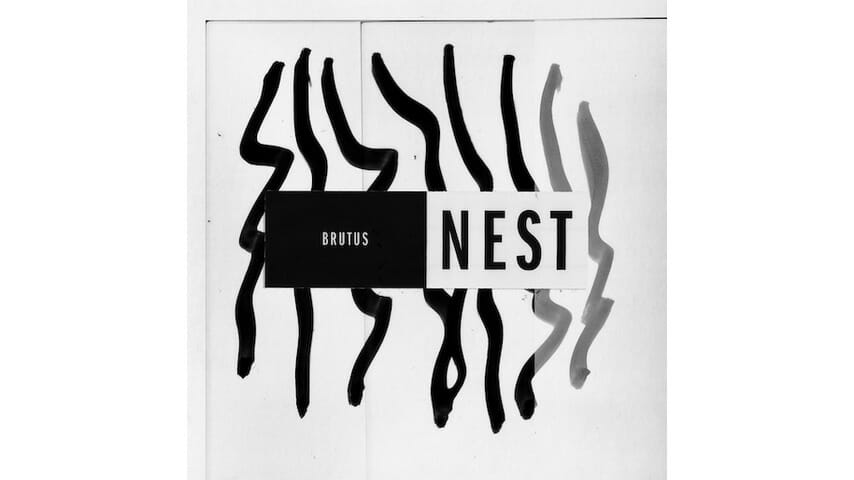Over the course of 2019, Paste has reviewed about 300 albums. Yet, hundreds—if not thousands—of albums have slipped through the cracks. This December, we’re delighted to launch a new series called No Album Left Behind, in which our core team of critics reviews some of their favorite records we may have missed the first time around, looking back at some of the best overlooked releases of 2019.
Peaks and troughs are often what gives an album cohesion and dynamism. They make albums feel like an emotional journey—like the artist and their listeners have been through thick and thin together, but emerge stronger by the end.
Brutus’ Nest is not one of those albums. Instead, the intensity never lets up, as if you’re in the crossfire on a battlefield for the entirety of the record, but feel a swell of relief and adrenaline when it’s all over. Sure, there are momentum changes, but the Belgian trio’s second album hardly provides an opportunity to exhale—and it’s all the better for it.
Much like their 2017 debut Burst, Nest is an invigorating fusion of post-rock, metal and hardcore, but it’s richer, more muscular and contains more moments of ambient beauty. The first thing you’ll notice about Brutus are their striking vocals: Drummer and lead vocalist Stefanie Mannaerts’ voice is a slightly raspy, mystical force of nature, often radiating into the ether like a battle cry. For those who wouldn’t normally consider themselves metal or hardcore fans, Mannaerts’ vocals might be enough to transcend their preferences. On songs like “Techno” or “War,” Mannaerts’ voice sounds like a life-or-death plea for mercy and a free-spirited display of grace. Her uninhibited elegance is the perfect foil to guitarist Stijn Vanhoegaerden and bassist Peter Mulders’ abrasive thrash, making Nest a well-balanced listen.
It all begins with the cutting riffs and agile rhythms of “Fire,” a song that provides a millisecond of silence before the guitar and drum assault starts. Mannaerts’ elemental voice is perfectly suited to the Twin Peaks-inspired lyrics and stark imagery that the spiky guitars provide. “Django” is another example of how Mannaerts’ unique vigor can transform lyrics about everyday life (“I’m never gonna leave your house / I wish that I could stay forever”) into epic soliloquies. After leaning into her more majestic qualities, “Cemetery” sounds like Mannaerts is spitting teeth on the sidewalk after a fist fight—cool and composed as if she hardly felt a thing. Her hardcore yelps coalesce with meticulous guitar warbles, and you can almost feel the floor begin to rumble from the soon-to-be mosh pits.
Like Mannearts’ voice, Vanhoegaerden’s guitars are similarly imposing. The fierce chug of “War” and thick shredding of “Horde V” are like wolves devouring their prey—they swarm with such a speed that it’s also staggeringly beautiful and mesmerizing to witness. Mannearts’ drums, on the other hand, adopt a bold minimalism and sturdy framework while occasionally succumbing and joining in on the cacophony. “War” sounds just like its namesake, where Mannearts’ pummeling drums are the oncoming fire; on “Cemetery,” her still muscular drumming keeps things from flying off the rails.
Despite its instrumental onslaught, Nest, like the title suggests, is a warm and enveloping listen. On “Carry,” Mannearts explores the romanticism of a tragic past world with shorter life spans and rampant warfare where dying young and “safe in my arms” is all you could hope for. Elsewhere, “Distance” contemplates the essential nature of intimacy and the painful longing that comes with long-distance relationships: Lyrics like “Run lady, where I can hold you / Make our time honest” might sound overly dramatic or simplistic if they weren’t coupled with such momentous and sublime rapture. Like other tracks, “Space” is concerned with the passage of time, mostly fearful of what fate will bring, but more sure than ever of feelings towards loved ones (“When the darkness falls / Love will overgrow with my eyes wide”). Nest simultaneously sounds like combat and refuge.
In the vast realm of heavy music in 2019, it’s hard to think of another record with as much evocative beauty. Imagery of a wintery battlefield comes to mind—the magnificent woods and blanketed snow will remind you of nature’s effortless beauty, but the harsh backdrop of pure carnage recalls humanity’s powerful dark side.
Just take the subject of the album’s eight-minute finale, “Sugar Dragon,” as an example of this dichotomy—a creature of presumably lofty stature and impressive brawn, but also enchanting presence. You can feel the whole album leading up to this point. After moments of brooding poise, the guitars and vocals engage in an extended, heartbreaking cry as if the band has finally spotted light at the end of the tunnel, only to realize they won’t be able to make it out alive. Nest is an album of incredible scope and emotional tension, and though there’s hardly a moment to rest, its strident beauty will restore you just the same.
